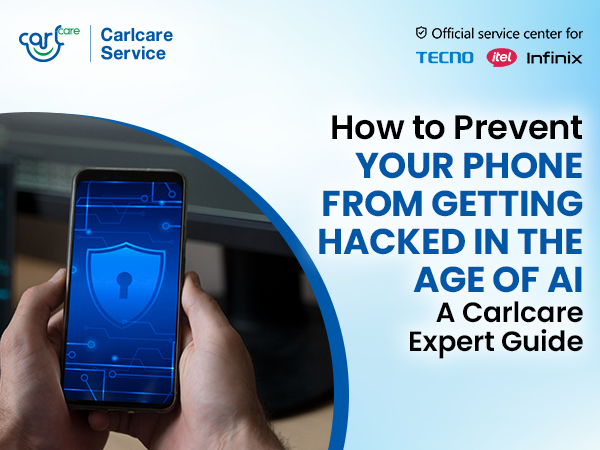
Our smartphones are more than just gadgets—they're our digital lifelines. From banking transactions to personal conversations, we store almost everything on them. But have you ever stopped to think—what if someone else is snooping on your phone without your knowledge? Cybercriminals are always finding new ways to break into smartphones, and the worst part? Most users don’t even realize it until it’s too late.
So, how do you know if your phone has been hacked? And more importantly, how do you protect yourself? Let’s dive in.
How to Tell If Your Smartphone Has Been Hacked
If your phone is acting strangely, don’t ignore it—it might be compromised. Here are some red flags:
- Unexplained Data Consumption
Noticed a sudden spike in your data usage? If you haven’t been streaming or downloading large files, malware might be secretly transmitting information from your phone to a hacker’s server.
- Strange Pop-Ups & Ads
Getting random pop-ups or intrusive ads even when you’re not browsing? That’s a clear sign of adware—a type of malware designed to flood your phone with unwanted advertisements.
- Unauthorized Transactions or Messages
If your friends complain about receiving strange messages from you, or you notice unapproved payments or logins, a hacker might have gained control of your device.
- Unfamiliar Apps Appear Out of Nowhere
Have you spotted apps you don’t remember installing? Cybercriminals often plant hidden apps to monitor your activity or steal data.
5. Rapid Battery Drain Without Explanation
If your phone’s battery life has suddenly worsened, it could be due to malware running in the background. Spyware and malicious apps constantly collect and send data to hackers, consuming more power than usual.
If you notice any of these warning signs, take action immediately. But prevention is always better than cure. Here’s how you can protect your smartphone from getting hacked.
7 Tips to Protect Your Smartphone from Hackers
- Keep Your Phone Updated
Software updates aren’t just about new features—they patch security vulnerabilities. Always update your phone and apps to stay ahead of hackers.
- Use Strong Passwords & Enable 2FA
A weak password is like an open door for hackers. Use unique, complex passwords and enable two-factor authentication (2FA) for extra security.
- Be Wary of Public Wi-Fi
Public Wi-Fi may be convenient, but it’s also a hacker’s playground. Avoid logging into sensitive accounts when connected to unsecured networks. If you must use public Wi-Fi, use a VPN.
- Only Download Apps from Trusted Sources
Stick to Google Play Store or Apple App Store. Downloading apps from third-party websites increases the risk of malware infections. Also, check app permissions—don’t grant unnecessary access.
- Install a Reputable Security App
A good antivirus or mobile security app can help detect and block threats before they cause damage. Look for trusted names like McAfee, Norton, or Bitdefender.
- Don’t Click on Suspicious Links
Phishing scams are everywhere. If you receive an email or message with an unknown link, think twice before clicking—it could be a trap to steal your personal data.
- Regularly Back Up Your Data
Always have a backup of your important files. If your phone gets hacked, a backup ensures you don’t lose everything. Use cloud storage or an external hard drive for extra security.
What to Do If Your Phone Has Been Hacked?
If you suspect your smartphone has been hacked, don’t panic—follow these steps to secure your data and remove any malicious threats:
1. Disconnect from the Internet
Turn off Wi-Fi and mobile data immediately to prevent further data theft or remote access by hackers.
2. Uninstall Suspicious Apps
Check your app list and remove any unknown or suspicious apps. If an app won’t uninstall, try Safe Mode (booting into Safe Mode disables third-party apps, making it easier to delete malware).
3. Change Your Passwords Immediately
Hackers often target accounts linked to your phone. Change passwords for your email, banking, and social media accounts to prevent unauthorized access. Use strong, unique passwords for each account.
4. Scan Your Phone with a Security App
Run a full malware scan using a trusted security app like McAfee or Norton. These apps can help detect and remove malware or spyware.
5. Remove Unauthorized Accounts or Devices
Go to your Google or Apple account settings and check for any unknown devices or login attempts. Remove anything suspicious.
6. Perform a Factory Reset (If Necessary)
If the hacking signs persist, consider factory resetting your phone. This will erase everything, including malware. Before doing this, back up important files—but don’t restore apps from a backup, as it may reintroduce malware.
7. Report the Incident
If your bank account was compromised, contact your bank immediately. You should also report identity theft to the authorities if personal information was stolen.

















